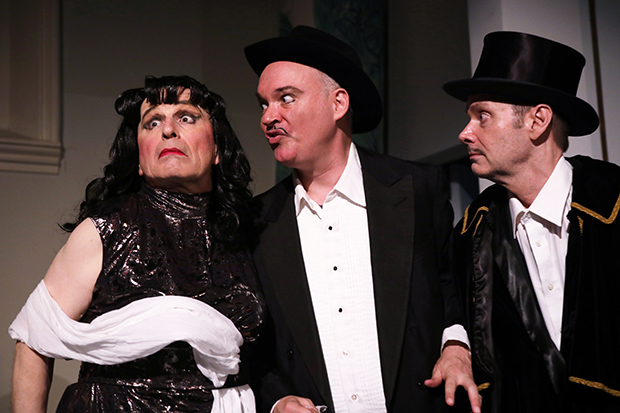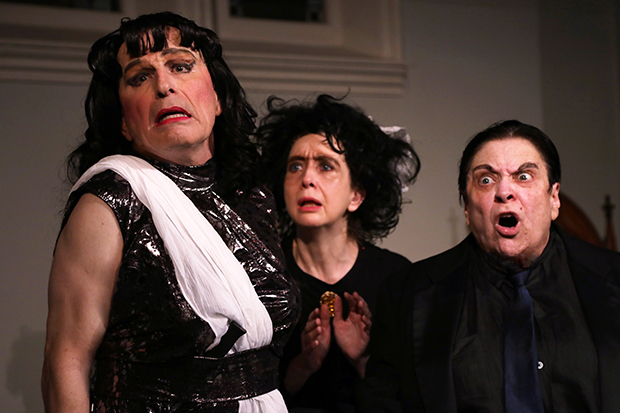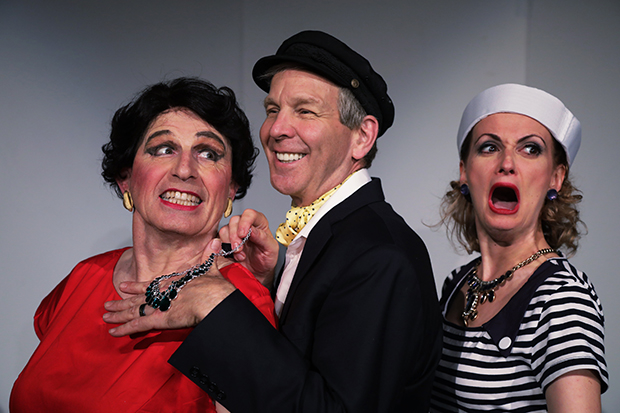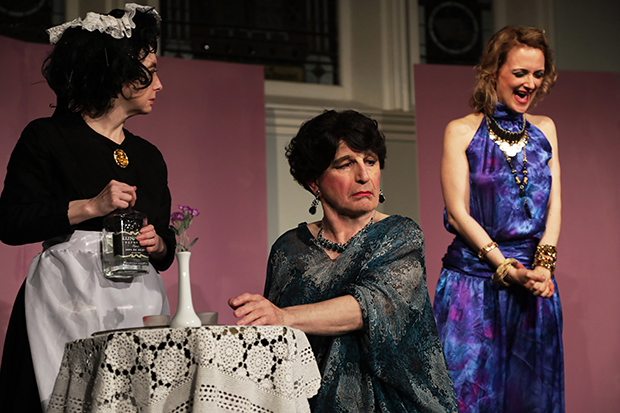Opera Life Is a Drag in Charles Ludlam's Galas
This Ridiculous revival tells the story of a Greek-American opera star named Maria Magdalena Galas.

(© Theo Cote)
Why are tragic and talented women so fabulous? This is the fundamental question undergirding the work of generations of drag performers, as well as the obsession of an even longer tradition of opera queens. The two groups collide in Charles Ludlam's Galas, now receiving an off-Broadway revival at Theatre at St. John's, just steps away from the West Village theater where it debuted 36 years ago.
That was Ludlam's Ridiculous Theatrical Company on Sheridan Square, the closest thing we've ever had to a national gay theater. In his relatively brief career during the 1970s and '80s, Ludlam became one of the most prolific artists of the American stage. He wrote, directed, and starred in 29 original plays for the Ridiculous, including Galas, in which he played a Greek-American prima donna not-so-loosely based on soprano Maria Callas. His longtime partner, Everett Quinton, played her trusty maid, in addition to designing costumes for that original 1983 production. Quinton now steps into the director's chair and title role for this timely remounting — just in time for the 50th anniversary of the Stonewall Riots, which also took place just steps away.

(© Theo Cote)
The play begins right after World War II, when Maria Magdalena Galas (Quinton) steps off the train in Verona to sing an engagement at the arena. Giovanni Baptista Mercanteggini (Beth Dodye Bass) meets her at the train station and quickly becomes her manager and husband. We know that Galas is an uncommon (if eccentric) talent from this first encounter, when Mercanteggini asks her about a caged songbird she has brought along to Italy. "Pet? No, this is my music teacher," Galas responds incredulously.
We watch her fame grow, as much for her talent as for her ability to provoke scandal. She embarks upon the greatest one of her life when she steps aboard the yacht of shipping tycoon Aristotle Plato Socrates Odysseus (Mark Erson). But can a life lived like an opera heroine end in anything but tragedy?

(© Theo Cote)
Quinton's performance recaptures the majesty of the old Ridiculous Theater: His Galas is ferocious and proud, swearing curses against her enemies and denying the existence of her rivals. "I will be heard," she proclaims at the end of the first scene, eyes piercing the audience. And we see in a later scene, when she lassos the pope's extended hand with a rosary to prevent herself from kneeling before the pontiff (played with swishy pomposity by Shane Baker), that no other diva can hope to upstage her. At the same time, Quinton endows his performance with genuine vulnerability, so that the finale really is as tragic as anything you're likely to see at La Scala.
The only other member of the company that rises to Quinton's level is Jenne Vath, who plays Galas's maid, Bruna. A bird's nest of black hair resting on her head, she bulges her eyes so that anyone seated in the last row of the Metropolitan Opera can clearly see (a striking effect in the intimate church sanctuary). Her voice is just as grand, a foreboding vibrato undergirding every eerily prophetic statement. She's hilarious.
Unfortunately, the other performances tend to be more stilted, stumbling over one another's lines and annihilating any potential for comic timing. This unevenness might just be a feature baked into the play (what performer could hope to overshadow La Divina?), but it lowers the stakes that no one save Vath even bothers to try.

(© Theo Cote)
While Ludlam famously directed and starred in all of his plays, it is clear that Quinton (a magnificent performer) would benefit from hiring an outside director when he's onstage. A couple of late-show quick changes are executed so sloppily that the stage is left with dead air at the very moment when tension should be at its highest.
Still, the design impresses on a shoestring budget: Jim Boutin's two-dimensional painted scenery evokes an antique theatricality that feels appropriate for a play about opera, while Ramona Ponce's lavish costumes (especially the ludicrous costume jewelry) are the definition of DIY glitz. Robert Neapolitan takes advantage of the natural surroundings of St. John's with his sparse but effective lighting, while his sound design reminds us why we're all here: During blackouts, we hear the unmistakable voice of the woman herself, a warble that is as beguiling today as it must have been 60 years ago.
Like so many drag acts, Galas is as much a loving tribute as it is a satire. It's about a woman who refuses to be bound by convention, and pays a heavy price for that unorthodoxy. That's a story that has dominated opera for centuries, and until quite recently, it was one that nearly every gay person intimately felt.








